Two Gallup surveys conducted since the start of the war with Iraq indicate how the conflict has affected consumer attitudes. Americans are rallying around the economy, just as they are supporting President Bush's decision to launch an attack on Iraq. This rally is a departure from the downward trend in consumer confidence that was underway through early March. However, the strong surge in positive consumer views seen in the first week of the conflict has subsided somewhat in recent days.
A March 24-25 Gallup Poll*, initiated five days after Bush announced the "opening stages" of war with Iraq, indicated a 16-point jump (from 23% to 39%) in the percentage of Americans saying the economy is getting better. The same survey also recorded an 11-point increase (from 22% to 33%) in the percentage describing current economic conditions in positive terms. In a new poll conducted March 29-30, those ratings fell back slightly. A third of Americans now believe the economy is getting better and 26% think the economy is in excellent or good shape. Still, these attitudes remain stronger than they were in early March.
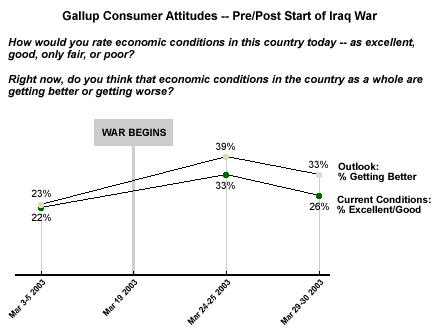
The current conflict's immediate impact on economic attitudes is similar to that found by Gallup following the Sept. 11, 2001, terrorist attacks. The initial war rally in ratings of current economic conditions was 11 percentage points (based on the March 24-25 poll), compared with 14 points after Sept. 11. The initial surge in the "outlook" measure was a 16-percentage-point increase, higher than the nine-point increase measured shortly after Sept. 11.
Gallup vs. The Conference Board and University of Michigan
Gallup's finding of increased consumer optimism differs from the March consumer confidence surveys issued last week by The Conference Board and the University of Michigan. That difference can be attributed largely to the fact that The Conference Board and Michigan surveys are based on interviews conducted mostly or completely before Bush's March 19 decision to initiate war with Iraq. Clear wartime readings of consumer attitudes will not be available from these organizations until mid-April.
The explanation for the enhanced ratings that Gallup have observed is most certainly the new war with Iraq, an event that triggered a 13-point bounce in Americans' approval ratings of Bush, and a 24-point bounce in their satisfaction with the way things are going in the country.
What these ratings mean for the economy is a different question. Consumer confidence is not necessarily indicative of consumer behavior, specifically retail spending. The economic impact of sudden rallies in consumer attitudes in times of national crisis or military interventions is particularly hard to gauge.
Same Pattern Surrounded Sept. 11
The current situation parallels the pattern observed in September 2001, when consumer confidence was trending downward at the beginning of the month, only to be shocked into a sudden rally after the Sept. 11 terrorist attacks. This effect is clear in the Gallup trends from the period.
Gallup's results from September 2001 were unambiguous. Following a sharp decline in early September, Americans expressed renewed economic confidence in the first few days after Sept. 11 -- both in assessment of current economic conditions (14 points) and in their perceptions about the direction of the economy (nine points in the percentage saying it was getting better). By mid-October, perceptions of current conditions had settled nearly back to their pre-Sept. 11 levels, while the outlook for the economy became even brighter.
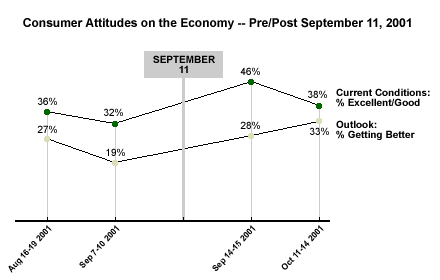
Longer term, both The Conference Board and University of Michigan consumer polls showed consumer confidence rising in the first six months after Sept. 11, only to begin the long slide in March 2002 that has continued until now. (The Gallup data presented for comparison below are a combination of Gallup's ratings of current economic conditions and outlook for the economy -- similar to the current and outlook components that compose The Conference Board and Michigan surveys.)
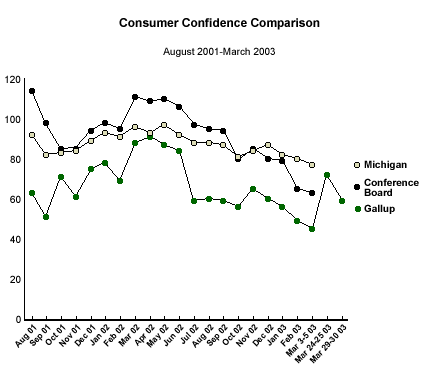
Impact of War on Consumer Attitudes
While it is clear that consumer attitudes weakened somewhat over the past week, it is not clear exactly why this occurred. Over the same period, Gallup has seen no change in public confidence about the conduct of the war or its prospects. The public was much more confident in the first weekend of the war, but by March 24-25, significant doubts had already set in. Those doubts did not increase in the March 29-30 poll.
- The percentage of Americans saying the war had so far gone "very well" for the United States dropped from 53% in a March 22-23 poll, to 34% in the March 24-25 poll. That figure is 33% in the latest survey, indicating essentially no change.
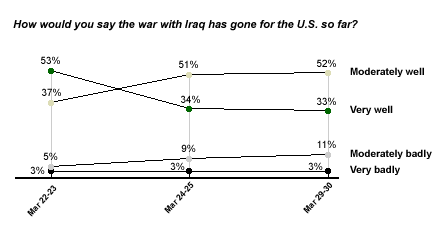
- Similarly, between March 22-23 and March 24-25, Gallup found a slight drop in the percentage saying the United States and its allies were winning the war (from 84% to 74%), but this figure remains 74% today.
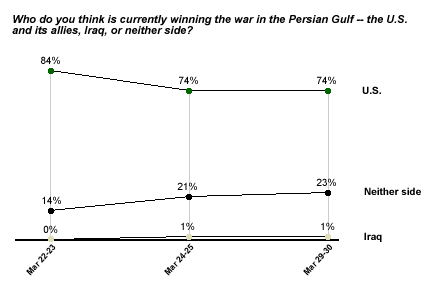
Gallup Consumer Attitude Updates
Gallup normally takes the general public's economic pulse twice monthly -- in the first and third weeks of the month. Gallup will be updating these figures even more frequently between now and at least mid-April, and will release the data as they become available.
*These results are based on telephone interviews with a randomly selected national sample of 1,012 adults, aged 18 and older, conducted March 29-30, 2003, and a separate sample of 1,008 adults conducted March 24-25, 2003. For results based on samples of these sizes, one can say with 95% confidence that the maximum error attributable to sampling and other random effects is ±3%. In addition to sampling error, question wording and practical difficulties in conducting surveys can introduce error or bias into the findings of public opinion polls.

